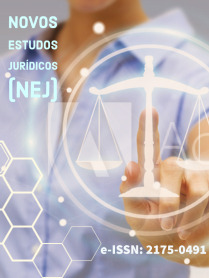(IN)DEVIDO PROCESSO: PRECEDENTES E TECNOLOGIA EM UM SISTEMA JUDICIÁRIO SOBRECARREGADO
DOI:
https://doi.org/10.14210/nej.v26n1.p375-405Palavras-chave:
Precedentes, Tecnologia, Vieses cognitivos, sobrecarga judicial.Resumo
Este trabalho pretende analisar os efeitos da introdução de ferramentas tecnológicas e de precedentes obrigatórios em um sistema processual sobrecarregado. Toma-se como ponto de partida o sistema judicial brasileiro, do qual se traça um panorama. Realizam-se estudos quantitativos em três tribunais nacionais, por meio de uma pesquisa empírica amostral e de julgados, averiguando prevalência de teses restritivas de demanda. Analisam-se, qualitativamente três casos que denotam formas, por intermédio das quais os precedentes obrigatórios podem ser utilizados para desestimular a propositura de novas ações. Também se verifica que o discurso judicial fomenta a preocupação com a quantidade de decisões, em detrimento da qualidade. Conclui-se que esses fatores são capazes de induzir vieses cognitivos favoráveis a julgamentos de improcedência, privando os autores de direitos que, em outras circunstâncias, lhes poderiam ser reconhecidos.Referências
ALMEIDA, W. G. R. de. Direito Processual Metaindividual do Trabalho: a adequada e efetiva tutela jurisdicional dos direitos de dimensão transindividual. Salvador: Editora JusPODIVM, 2016.
ALTMAN, M. (org.). Real-World Decision Making: An Encyclopedia of Behavioral Economics. Santa Barbara: Greenwood, 2015.
BALDI, S. Normative versus Social Constructivist Processes in the Allocation of Citations: A network-analytic model. American Sociological Review. v. 63. p. 829-846. 1998. DOI: https://doi.org/10.2307/2657504
BRASIL. Superior Tribunal de Justiça. REsp 911.802/RS, Rel. Ministro JOSÉ DELGADO, PRIMEIRA SEÇÃO, julgado em 24/10/2007, DJe 01/09/2008.
BRASIL. Tribunal de Justiça do Estado de São Paulo; Processo Paradigma: IRDR Nº 0043917-79.2017.8.26.0000; Assunto: DIREITO CIVIL - Obrigações - Espécies de Contratos - Prestação de Serviços; Órgão Julgador: Turma Especial de Direito Privado; NUT: 8.26.1.000020; Relator(a): Desembargador GOMES VARJÃO; Data de Admissão: 25/06/2018; Data de Publicação do Acórdão de Admissibilidade: 12/07/2018; Data de Mérito Julgado: 15/10/2018; Data de Publicação do Acórdão de Mérito: 24/10/2018.
CAPPELLETTI, M.; GARTH, B. Access to Justice: A World Survey. Milano: Giuffrè, Sitjoff and Noordhoff, 1978.
CARROLL, J. S. The Effect of Imagining an Event on Expectations for the Event: An Interpretation in Terms of the Availability Heuristic. Journal of Experimental Social Psychology, v. 14, n. 1, 1978. p. 88-96: DOI: https://doi.org/10.1016/0022-1031(78)90062-8
CHABLO, A. What can artificial intelligence do for Anthropology? Current Anthropology, v. 37, p. 553-555, 1996. DOI: https://doi.org/10.1086/204518
CONSELHO NACIONAL DE JUSTIÇA. Justiça em números: 2018. Disponível em http://www.cnj.jus.br/files/conteudo/arquivo/2018/08/44b7368ec6f888b383f6c3de40c32167.pdf. Acesso em: 21 maio 2019.
DIÁRIO INDÚSTRIA E COMÉRCIO. Fux diz que novo CPC elimina formalidades. Disponível em: https://www.diarioinduscom.com/fux-diz-que-novo-cpc-elimina-formalidades/. Acesso em: 11 maio 2019.
DREYFUS, H. L.; DREYFUS, S. E. Mind over machine: The power of human intuition Expertise in the era of the computer. New York, Free Press. 1986. DOI: https://doi.org/10.1109/MEX.1987.4307079
FREITAS, J.. Direito Administrativo e inteligência artificial. Interesse Público - IP, Belo Horizonte, ano 21, n. 114, p. 15 - 29, mar./abr. 2019
FRIEDMAN, M. There’s no such thing as a free lunch. Chicago: Open Court Pub, 1975.
GALANTER, M. Access to justice in a world of expanding social capability, 37 Fordham Urb. L.J. 115, 2010.
GALANTER, M. Why the “haves“ come out ahead: speculations on the limits of legal change. 9 Law & Soc’y Rev., v. 95, 1974-1975. DOI: https://doi.org/10.2307/3053023
GARAPON, A. O guardador de promessas: Justiça e Democracia. Lisboa: Instituto Piaget, 1996.
INSTITUTO DE PESQUISA ECONÔMICA APLICADA - IPEA. Custo Unitário do Processo de Execução Fiscal na Justiça Federal. Brasília: IPEA, 2012.
KAHNEMAN, D.; SLOVIC, P. (org.). Judgment under uncertainty: heuristics and biases. Cambridge: Cambridge University Press, 1982; DOI: https://doi.org/10.1017/CBO9780511809477
KUZNIETZ, G. Inteligência artificial no Direito chegou para ficar. Disponível em: https://www.jota.info/opiniao-e-analise/colunas/coluna-do-demarest/intelige ncia-artificial-no-direito-chegou-para-ficar-05122018. Acesso em: 13 maio 2019.
MAIA FILHO, M. S.; JUNQUILHO, T. A. Projeto Victor: perspectivas de aplicação da inteligência artificial ao direito. Revista de Direitos e Garantias Fundamentais, Vitória, v. 19, n. 3, p. 219-238, set./dez. 2018. DOI: https://doi.org/10.18759/rdgf.v19i3.1587
MARINONI, L. G. Aproximação crítica entre as jurisdições de civil law e de common law e a necessidade de respeito aos precedentes no Brasil. Revista da Faculdade de Direito - UFPR., Curitiba, n.49, p. 11-58, 2009. DOI: https://doi.org/10.5380/rfdufpr.v49i0.17031
MIESSA, É. Nova realidade: teoria dos precedentes e sua incidência no processo do trabalho. Revista eletrônica [do] Tribunal Regional do Trabalho da 9ª Região, Curitiba, PR, v. 5, n. 49, p. 9-57, abr. 2016.
NISBET, R. E.; ROSS, L. Human inference: strategies and shortcomings of social judgment. Englewood Cliffs, NJ: Prentice-Hall, 1980.
PERELMAN, C.. Ética e direito. Tradução de Maria Ermantina de Almeida Prado Galvão, 2. ed. São Paulo: Martins Fontes, 2005.
POHL, R. F. Cognitive Illusions: A Handbook on Fallacies and Biases in Thinking, Judgement and Memory, Hove: Psychology Press, 2004.
POUNDSTONE, W. Priceless: The myth of fair value.New York: Hill and Wang, 2010.
RHODE, Deborah. Access to Justice. London: Oxford University Press, 2004.
ROUSSEY, L.; SOUBEYRAN, R.. Overburdened Judges. International Review of Law and Economics, v. 55, September 2018. p.21-32. DOI: https://doi.org/10.1016/j.irle.2018.02.003
ROSENBERG, D.. Mass tort class actions: What defendants have and plaintiffs don't. Harvard Journal on legislation, v. 37, p. 393-431, 2000.
SATHE, S.P. Judicial Activism in India: Transgressing borders and enforcing limits. Delhi: Oxford University Press, 2007.
SHAPIRO, M. M.; SWEET, A. S.. On Law, Politics, & Judicialization. Oxford; New York: Oxford University Press, 2002. DOI: https://doi.org/10.1093/0199256489.001.0001
SRULL, T.; WYER, R.. The role of category accessibility in the interpretation of information about persons: Some determinants and implications. Journal of Personality and Social Psychology, v. 37, n. 10, 1979. p. 1660–1672. DOI: https://doi.org/10.1037/0022-3514.37.10.1660
SUPERIOR TRIBUNAL DE JUSTIÇA. Banco de teses do Superior Tribunal de Justiça. Disponível em: https://scon.stj.jus.br/SCON/jt/. Acesso em: 20 ago. 2020.
SUPERIOR TRIBUNAL DE JUSTIÇA. Tema 939, Disponível em: http://www.stj.jus.br/repetitivos/temas_repetitivos/pesquisa.jsp?novaConsulta=true&tipo_pesquisa=T&sg_classe=REsp&num_processo_classe=1551951. Acesso em: 20 ago. 2020.
TATE, C. N.; VALLINDER, T.. The global expansion of judicial power. New York: New York University Press, 1995
TVERSKY, A.; KAHNEMAN, D.. Availability: A heuristic for judging frequency and probabilityCognitive Psychology, v. 2, n. 5, 1973. p. 207–232. DOI: https://doi.org/10.1016/0010-0285(73)90033-9
TVERSKY, A.; KAHNEMAN, D.. Extensional versus intuitive reasoning: The conjunction fallacy in probability judgment. Psychological Review, v. 90, n. 4, 1983. p. 293–315. DOI: https://doi.org/10.1037/0033-295X.90.4.293
TRIBUNAL DE JUSTIÇA DE GOIÁS. Núcleo de Gerenciamento de Precedentes. Disponível em: https://www.tjgo.jus.br/index.php/nucleo-de-gerenciamento-de-precedentes-nugep/recursos-repetitivos. Acesso em: 20 ago. 2020.
TRIBUNAL DE JUSTIÇA DO RIO GRANDE DO SUL. Núcleo de Gerenciamento de Precedentes. Disponível em: https://www.tjrs.jus.br/novo/institucional/2o-grau/nugep/. Acesso em 20 de agosto de 2020.
VIANNA, L. W. A Judicialização da Política e das Relações Sociais no Brasil. Rio de Janeiro: Revan, 1999.
VILHENA, O. V.. Supremocracia. Revista Direito GV, São Paulo, n. 4, p. 441-464, jul./dez. 2008. DOI: https://doi.org/10.1590/S1808-24322008000200005
VITORELLI, E.. Acordo coletivo dos planos econômicos e por que ele não deveria ser homologado. Disponível em: https://www.jota.info/paywall?redirect_to=//www.jota.info/opiniao-e-analise/artigos/acordo-coletivo-dos-planos-economicos-e-por-que-ele-nao-deveria-ser-homologado-15012018. Acesso em: 21 maio 2019.
VITORELLI, E.. O devido processo legal coletivo: dos direitos aos litígios coletivos. São Paulo: RT, 2016.
VITORELLI, E.. Collective due process of law: Reconciling representation and participation. In: Cadiet, L.; Hess, B.; Requejo Isidro, M.. (org.). Approaches to Procedural Law The Pluralism of Methods. 1ed.Baden-Baden, Germany: Nomos, 2017. v. 1, p. 345-391. DOI: https://doi.org/10.5771/9783845285122-343
ZAMIR, E.; TEICHMAN D. Behavioral law and economics. London: Oxford University Press, 2018. DOI: https://doi.org/10.1093/oso/9780190901349.001.0001
ZIMMERMAN, G. Como advogar no século XXI. Disponível em: http://www.lex-net.com/new/como-advogar-no-seculo-xxi/. Acesso em: 11 maio 2019.
ZUCKERMAN, Adrian (org.). Civil Justice in Crisis. London: Oxford University Press, 2000.
Downloads
Publicado
Como Citar
Edição
Seção
Licença
Na qualidade de autor(es) da colaboração, original e inédita, sobre o qual me(nos) responsabilizo(amos) civil e penalmente pelo seu conteúdo, após ter lido as diretrizes para autores, concordado(amos) plenamente com as Políticas Editorias da Revista Novos Estudos Jurídicos - NEJ e autorizo(amos) a publicação na rede mundial de computadores (Internet), permitindo, também, que sua linguagem possa ser reformulada, caso seja necessário, sem que me(nos) seja devido qualquer pagamento a título de direitos autorais, podendo qualquer interessado acessá-lo e/ou reproduzi-lo mediante download, desde que a reprodução e/ou publicação obedeçam as normas da ABNT e tenham a finalidade exclusiva de uso por quem a consulta a título de divulgação da produção acadêmico científico.


















